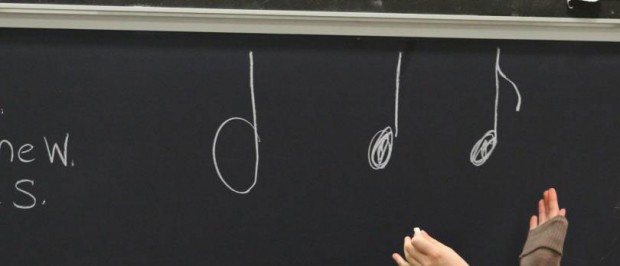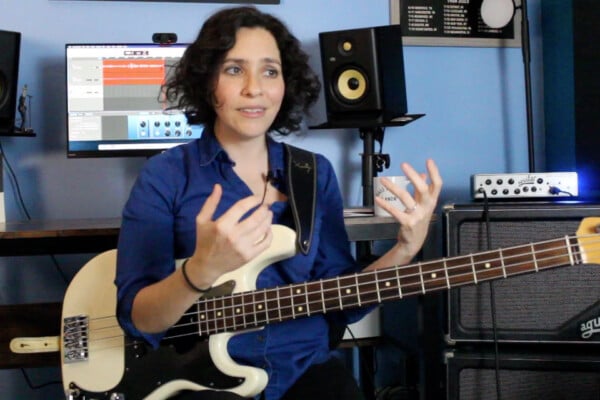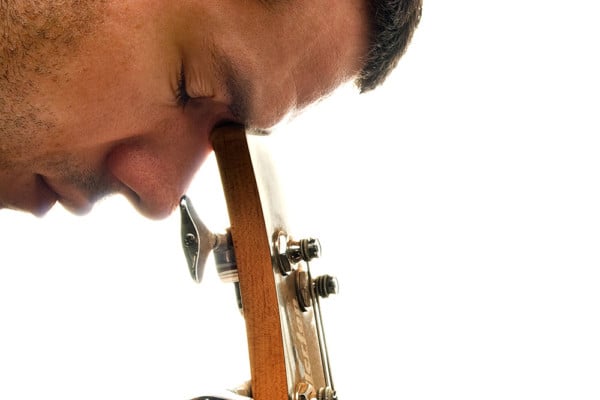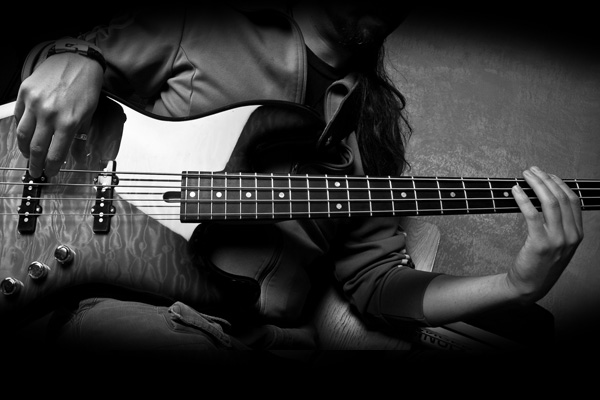Do I Really Need to Go To Music School?

Q:I’m a bass player from Mexico and I am currently studying in Paris and looking for some gigs. I am a little overwhelmed right now by school, which is a jazz-oriented school. I like jazz, but I feel a little forced to learn licks and that stuff. I’m not saying I’m the greatest bass player or anything, but I don’t feel very motivated to study those pieces over and over like I used to do. I don’t know why, maybe it’s too much information. I worry that I am wasting my time, and I think I have learned a lot on my own, using books and with some private bass lessons. I know you attended Berklee, and I know you aren’t a psychologist (haha), but I would love to hear what you think about the academic side of things and how you rate the importance of music school.
A: As is the case with many of my answers, I will start by saying that you’re the best judge of how to handle your own situation.
Everybody learns a little differently, and some do better in a scholastic environment than others. Personally, I didn’t do very well at Berklee. Thanks to that, it was bad for my self-confidence. I almost quit playing all together, thinking that I just must not “have what it takes”.
The honest truth is that I simply wasn’t into the way the information was presented to me, and I got pretty complacent. I also didn’t like jazz at the time (I was a total metal-head back then). So I just didn’t care about school and it was reflected, not only in my attitude, but also my grades. The result was that I failed to internalize the information during that time in my life.
I think some of us need a school to lead us along and show us what to work on and how to interpret the information properly. Others, like myself (and possibly you?) learn much more through discovering things in our own way, and at our own pace. That can happen through a combination of gigging, trial and error, playing with others, making mistakes on the band stand and then discovering what we lack in the areas of technique, theory, groove, and so forth.
It wasn’t until I started gigging that I really understood why I needed to know certain things and also what those things actually were.
One of the big positives of the scholastic experience is the exposure you get to other players. But you have to do something about that. If I had put forth the effort at Berklee, I would have had a wealth of talented players around me to play with, and I could’ve both learned a lot. Not to mention the connections that could have been made during that time, which always pay dividends down the road.
Instead, I partied and hung out with other crowds and basically wasted my time there. I deeply regret that now and often wish that I could go back and do it over again. It took me years to develop my playing on my own to the point it likely would’ve been had I put in the time and effort in school.
The actual degree from a music school isn’t that relevant to life unless you want to go into teaching at a school (which, these days, likely requires you to get a PhD if you really want a good position). Other than that, the music school is really there to prepare you as a player and if you’re not interested in the style of music taught there, you might be wasting your time and money.
I implore you to deeply consider what type of player you wish to be. If you want to be a “gun for hire,” do-it-all, bad ass bassist, then you will actually have to understand jazz theory relatively well and be familiar with that vocabulary.
In order to freelance, you will also have to read music well (or at least have incredible ears and have learned a wealth of tunes in order to find your way through tunes well enough to get called back). You’ll need to have a solid pocket and reasonable chops. Music school is fantastic for that stuff.
For me and where I was at during my time at Berklee, I would’ve been better served leaving school and starting my gigging career earlier, because my heart wasn’t in it.
If I knew then what I know now? I would go back in a heartbeat and work my butt off, join every ensemble I could fit in to my schedule, take arranging and composition courses and go to every jam session I could find. I think I’d be light years ahead of where I am now, musically. I had to work very hard to make up for lost time while my classmates had moved to NYC and started gigging with everyone under the sun (many of whom are the guys nowadays. I bet many of them don’t even know that we went to school together because I spent so little time there.
Granted, I (eventually) put the work in, made up for lost time and I’m doing pretty well as a working musician. No matter what, you have to pay your dues. So if it isn’t in the scholastic setting, it has to come from some other source or sources.
There are no guarantees either way, but most people do better in school and the ones that do better on the streets are the guys who have the work ethic to make up for the lack of focus and direction that a scholastic program can provide.
It’s a tough call and one that may have serious consequences, depending on your personality and the learning style that best suits you. Whatever you choose, don’t waste your time. Once you’re comfortable choosing a direction, put every thing you can of yourself into the path you choose. Talent really is a fancy word for hard work. You’ll get out whatever you put in.
You’re not in a unique situation here, which is good news. Talk to the teachers and fellow students you respect and see what insight they have to offer. Discover what sort of learning style best suits you. Take inventory of the type of player you want to be and what your ideal professional life needs to look at. Then you’ll be ready to decide.
Readers, what’s your experience? We’d love to hear from you. Tell us your story in the comments.
Have a question for Damian Erskine? Send it to [email protected]. Check out Damian’s instructional books, Right Hand Drive and The Improviser’s Path.




I find this article really interesting, and it has given me a lot to think about. My personal experience with professional music studies was of only one year. I dropped out because I didn’t feel it was helping me to become a better musician, as a matter of fact I got stuck in a rut for a long time due to it, nothing flowed anymore, even though I did learn some theory and fundamentals, but I got stuck musically.
Even though I’m not a pro musician, and I took a different path in regards to my studies (Bachellor’s in humanities and languages teaching, specialist in modern and contemporary art, and currently taking a masters in art an aesthetics), my musicality seems to have improved and developed via both music related and non related activities, that’s just the way my brain works. Also, I don’t have the discipline it takes to study EVERYTHING, and by that I mean all the subjects in particular that you have to take at college. I only seem to be relatively disciplined when it comes to playing bass, but still I admit I need more of a method, even though I’m doing fine (had I more time, I would focus more, but a master’s takes a lot of dedication as well).
The other point is motivation. I wasn’t motivated at all when I took music at college, but when I teach myself I do get motivated, to the point that all the things I do best in life are the ones no one has ever taught me, and I do them better than any other person can. Taking that into account, I hope to become a better than average bassist, I may not have what it takes to be the best, but I’m pretty sure I do have enough to be a very good musician and bassist.
Sorry for the long post, just my thoughts on the matter….
I think You nailed it Damian.
I hope you will consider using gender neutral pronouns in the future, for those of us who don’t want to feel alienated by reading articles that should be about playing bass, not about “guys” playing bass. Thank you!
Forgive the man, don’t be picky! Unfortunately the vast majority of us bass players are “guys” (however I think the word can be used to both men and women, if I’m not mistaken). Peace.
Although we are the majority I am surprised by how many women play bass. Of the musicians that I have met I find a higher percentage of girls playing bass than guitar or drums, but keyboard definitely has a higher percentage of females. It would be interesting to see some figures (statistics that is). Maybe they meet more guys if they play bass, lol.
I’m currently at music school and I love it, but I see people who don’t enjoy it and just want to do their own thing. I find that my passion within playing bass is playing everything I can get my hands on. The main thing I see from the people who don’t enjoy it is too much focus on one thing, be that pure technique, songwriting etc.
I think the things to ask about is not ‘is music school good’, it’s ‘is music school for me, and, if so, which one?’ These questions are hard to answer because there aren’t many taster weeks or days or anything of that vein to show how they can help. In Daniel’s case below, he states he doesn’t have the discipline, and that’s fine, but you’ve got to say to yourself ‘can I do nothing but play music? Do I love this enough to give up a lot of my life to it?’ I’ve made a lot of sacrifices to be here, but to me it’s all worth it to get to wherever it may take me in the future.
Another point about going to a music school is contacts. If you want to make it big, it’s definitely who you know. And although you may not be in the same school as the next Michael Jackson or Adele, there will be people who become successful, even if only minorly, and could end up calling you.
In my experience, I’ve grown as a player and musician, and I’ve definitely enjoyed myself thus far.
I know where you’re coming from, as I have many friends and relatives who are professional musicians. In my personal case apart from my undisciplinned habits (something relative) I have other passions to fulfill, and I don’t plan to make a living out of playing music. I would feel frustrated however if i didn’t not dedicate time to either music or my other passions in life, no matter if they mean an economic income or not.
About making contacts, I’ve made quite a few over the time I’ve lived here in Mexico, but considering that I’ll be moving to nother city by december, having a band at this point won’t pay off in the end since nothing estable will come out of it. Once I settle in my new home next year, looking for a band and making new contacts will be a priority. Besides, i’ll be able to dedicate more time to that as i will have finished my master’s, something i love but that definitely takes time to do music with other people.
Really relevant for me today, I just sent in my applications for university studies and did not choose to pursue a higher music education, as of now. (I’m going for teacher educations, Swedish and history, etc.)
I’m really conflicted over how I’ll keep up playing and gigging while leading a “normal” 9-5 life. What I know is that I feel the absolute best when I’m on a stage, playing great music with great people, and I’ve always pictured me continuing that.
I’m having a hard time phrasing what I really mean; What it all boils down to is my anxiety of growing up, I guess.
Damian, you are absolutely right in this!